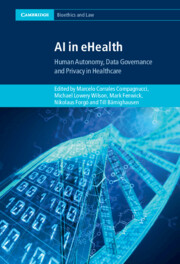Book contents
- AI in eHealth
- Cambridge Bioethics and Law
- AI in eHealth
- Copyright page
- Contents
- Contributors
- Preface
- Acronyms
- 1 Mapping the Digital Healthcare Revolution
- Part I Platforms, Apps and Digital Health
- 2 Technology-Driven Disruption of Healthcare and ‘UI Layer’ Privacy-by-Design
- 3 Social Media Platforms as Public Health Arbiters
- 4 Promoting the Use of PHR by Citizens and Physicians
- Part II Trust and Design
- Part III Knowledge, Risk and Control
- Part IV Balancing Regulation, Innovation and Ethics
- Index
- Cambridge Bioethics and Law
- References
4 - Promoting the Use of PHR by Citizens and Physicians
Proposed Design for a Token to Be Allocated to Citizens
from Part I - Platforms, Apps and Digital Health
Published online by Cambridge University Press: 08 September 2022
- AI in eHealth
- Cambridge Bioethics and Law
- AI in eHealth
- Copyright page
- Contents
- Contributors
- Preface
- Acronyms
- 1 Mapping the Digital Healthcare Revolution
- Part I Platforms, Apps and Digital Health
- 2 Technology-Driven Disruption of Healthcare and ‘UI Layer’ Privacy-by-Design
- 3 Social Media Platforms as Public Health Arbiters
- 4 Promoting the Use of PHR by Citizens and Physicians
- Part II Trust and Design
- Part III Knowledge, Risk and Control
- Part IV Balancing Regulation, Innovation and Ethics
- Index
- Cambridge Bioethics and Law
- References
Summary
The digitalised medical and health records of citizens are stored in the Electronic Health Records (EHR) of hospitals or clinics, and Personal Healthcare Records (PHR). The quality of medical care is improved when physicians can access the past records of patients. A user-friendly service that enables individual citizens to share their health and medical records in PHR with their physicians is essential to achieve this. In order to encourage patients and physicians to share medical records utilising PHR, while avoiding conflict with the recent trend demanding that citizens have autonomous control of their own personal information, governments have to develop legal measures to encourage individual citizens to take the initiative to record their medical and health data in their PHR and to give their physicians access to it. The author proposes mathematical schemes that can be implemented in the legal incentives deemed suitable for such encouragement.
- Type
- Chapter
- Information
- AI in eHealthHuman Autonomy, Data Governance and Privacy in Healthcare, pp. 87 - 122Publisher: Cambridge University PressPrint publication year: 2022

